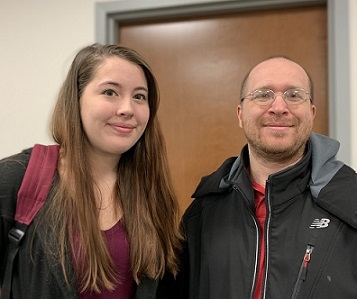
Psychology professors regularly select students to serve as a Peer Teaching Assistant (PTA) in some of the courses that they teach, including PSY 136- Statistics for Behavioral and Social Science, PSY 201- Writing for Psychology, PSY 262- Social Psychology, PSY 261- Biological Psychology, and PSY 343- Research Methods-Data Analysis II.
What exactly does a PTA do? Although the duties of PTAs differ slightly for each course, it is relatively common for PTAs to attend every class, take attendance, hold office hours, lecture or lead discussion, and perform office duties such as print, copy, and send emails. In addition, PTAs may also be available to serve as tutors to ensure students are staying up to date with their assignments and preparing well for exams.
What can students gain by serving as a PTA? Being a PTA allows students to build working relationships with their Psychology professors, which is especially important if students are planning to attend graduate school. For a lot of graduate programs, having teaching experiences will enhance your chance of getting in.
Alicia Hughart, Senior Psychology Major and Active Minds president, took part in being a PTA for PSY 262- Social Psychology where she worked inside and outside of the classroom. Alicia utilized being a PTA for field placement credit, in which she worked alongside Dr. Schurtz to create conceptual exams, review students’ papers, and even conduct lectures. Due to her completing this assistantship for field placement credit, she is required to create a poster presentation that she will present in May. Completing this poster and presenting it provides students with professional presentation experiences that they can add to their CVs!
Alicia Hughart and Dr. Schurtz
For me as a Junior Psychology major, I am currently completing a teaching assistantship alongside with Dr. Wong for PSY 201- Writing in Psychology. My duties consist of facilitating class discussions, reading student’s papers, working with students inside and outside of the classroom to ensure they are understanding empirical articles, and completing various office tasks. During my time as a PTA through field placement credit, my relationship with Dr. Wong has strengthened, I was able to achieve my personal goals, and I truly believe I gained essential interpersonal skills I can utilize as I continue my undergraduate degree.
Makaylah Morton and Dr. Wong
In sum, if you are completing a course that currently has a PTA and you are interested in becoming one, talk to your professor and inquire about the duties expected. Ensuring you are working hard in your course, receiving a good grade, and participating in class discussion is a great way to set yourself apart to be offered such position!
By: Makaylah Morton





